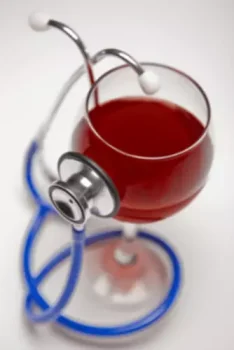
Acute alcohol administration resulted in expected, dose-related alterations in subjective, psychomotor, cognitive, and physiological effects. These effects typically were greater after the higher dose, and the time course follows the known effects of alcohol (Brasser et al., 2004; Holdstock et al., 2000). Subjective measures of alcohol intoxication were greatest at 30 minutes and returned to or were close to predrinking levels by the end of the assessment kudzu for alcohol cravings period (3 hours). Psychomotor (stance stability/body sway) and cognitive function were most affected at 60 minutes, and they too returned to or were close to baseline by 3 hours. Heart rate and skin temperature effects were collected only for the first 10 minutes after drinking because that was the only period during which the participants were sitting calmly and not required to perform any tasks (and thus offered artifact-free data).
- We have subsequently shown that puerarin is the major active isoflavone because 7 days treatment with this compound alone (1200 mg/day) produced a similar reduction of binge drinking as the extract (Penetar et al., 2012).
- However, limited clinical studies exist to recommend use for any indication.
- One such resource is AlcoholAwareness.org, which offers a wealth of information, support, and guidance for individuals and their families dealing with alcoholism.
Kudzu root shopping tips
Thus, altered acetaldehyde metabolism is not a likely explanation for kudzu extract effects in humans. Alcohol resulted in a dose-related alteration in subjective measures of intoxication, impairment of stance stability, and vigilance/reaction time. Kudzu extract did not alter participants’ subjective responses to the alcohol challenge or to alcohol’s effects on stance stability or vigilance/reaction time.

Kudzu’s Benefits for Health
- Thus, the mechanism of action of this herbal preparation to reduce alcohol consumption remains elusive.
- Thus, scientists need to do more research in this area on the effects of kudzu root specifically.
- Regardless of the mechanism of action, the present finding that a modest, single dose of kudzu extract reduces binge drinking has profound implications as it offers a unique opportunity for early intervention for problem drinkers.
We recently demonstrated that kudzu extract does not potentiate the intoxicating effects of alcohol (Penetar et al., 2010) and it does not interfere with sleep wake activity (Bracken et al., 2011). In addition, this was not a treatment clinical trial, so the effects on alcohol intake might have been more robust in treatment-seeking individuals. We developed a standardized kudzu extract that preserved the ratio of the major isoflavones found in the raw root, except that the concentration of isoflavones was increased to 25%. This randomized between-subject, double-blind, placebo-controlled study involved 2 weeks of baseline, 4 weeks of treatment, and 2 weeks of follow-up.
Associated data
Josh Lee is a clinician and researcher with a focus on medication-assisted treatment of alcohol and opioid use disorders. He has conducted multiple clinical trials examining the use of naltrexone in primary care and other community settings. As a practicing physician, Josh helps manage the NYC Health + Hospitals/Bellevue addiction medicine clinic in adult primary care. As a specific example, a small study published in the journal Drug and Alcohol Dependence involved 140 adults and indicated that a short session of aerobic exercise reduced cravings for alcohol (10). Disulfiram is a pill that causes unpleasant side effects when combined with alcohol. Generally, the more alcohol you drink on a regular basis, the longer it takes for cravings to subside.
- It’s marketed as a treatment for alcoholism, diabetes, and inflammation.
- By staying committed to your goals and seeking support when needed, you can develop the resilience and skills necessary to manage cravings effectively.
- Acamprosate is prescribed to people after they’ve quit drinking alcohol to help them maintain abstinence.
- Participants were instructed to report when they consumed each drink, which was defined as a 12 oz can of beer, 5 oz glass of wine or 1.5 oz distilled spirits.
Side/adverse effects also were tracked on a daily basis by entries in their diaries; items addressed a wide range of somatic complaints. Because prescription medications are not universally used or have a perceived modest effect (Krystal et al., 2001; Mark et al., 2003), providing heavy drinkers with any type of intervention that yields even a modest reduction in drinking is desirable. Furthermore, there is a need to develop efficacious medicines from natural products that have a low incidence of side effects or toxicity (Xu et al., 2005). The ultimate role that natural preparations play will be complementary and might be useful in treating drug withdrawal and possibly relapse (Lu et al., 2009). A survey of academic research on exercise and AUD has generally shown a correlation between physical activity such as cycling, running or other aerobic activity and reduced alcohol cravings or alcohol consumption (9). Furthermore, the men who took kudzu had fewer heavy drinking days per week and had significantly more consecutive days with no alcohol consumption (2).
Participants weighed on the average 165.5±11.1 pounds and had an average body mass index of 25.3±1.3. They consumed 7.8±0.63 drinks per week and did not abuse nor were dependent on any drug. The protocol and informed consent were approved by the McLean Hospital Institutional Review Board and individuals were paid for their participation. In conclusion, while kudzu shows promise as a natural remedy for alcoholism, more rigorous clinical studies are needed to determine its effectiveness. It is crucial for individuals struggling with alcohol addiction to seek professional help and consider evidence-based treatments.
Osteogenic activity

AlcoholAwareness.org provides a platform where you can access various free resources, including articles, self-assessment tools, and information about local support groups and treatment centers. These resources can be instrumental https://ecosoberhouse.com/ in guiding you toward effective strategies for overcoming alcoholism. A computerized Continuous Performance Test II (CPT II) (Conners, 2000) was used to assess sustained attention and concentration abilities.
- Data due to dropouts were handled as missing data and no values were entered.
- An analysis of the participant’s alcohol craving or urge to drink prior to the drinking session revealed that neither was affected by kudzu pretreatment.
- In addition, the diaries permitted the participants to enter additional data that could not be recorded on the watch.
- However, if you want to cut down on drinking or detoxify your body during alcohol withdrawal, this plant may be able to help.
- The mixture was poured into 3 equal volume cups and placed on ice until administration.
- Alcoholism is a complex condition, and its treatment should not be taken lightly.


